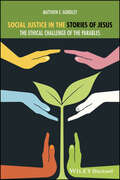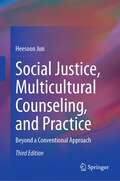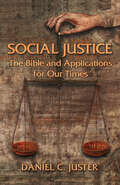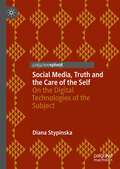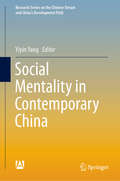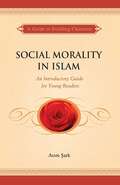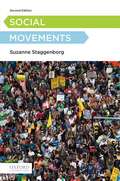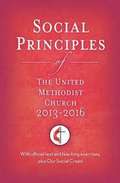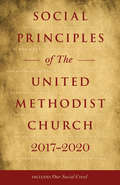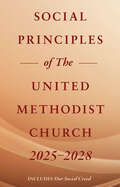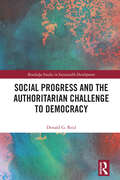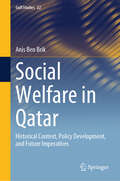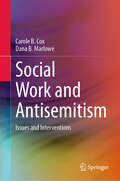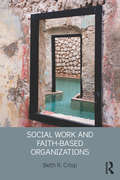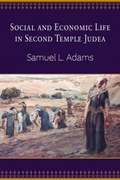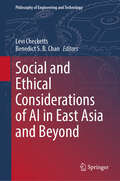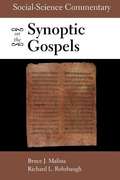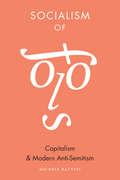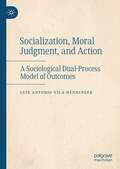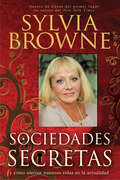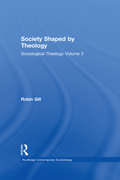- Table View
- List View
Social Justice in the Stories of Jesus: The Ethical Challenge of the Parables (Lived Religions)
by Matthew E. GordleyInvites a new generation of readers to apply ethical reasoning to social justice challenges, accessible to people of faith from a broad range of backgrounds Social Justice in the Stories of Jesus introduces readers to the parables of the New Testament while exploring how they relate to social justice, ethics, and key issues of modern society. Centering on themes of mercy, justice, and human dignity, this unique volume invites readers to reflect on the meaning of Jesus's parables both in their original setting and in the context of present-day moral and ethical challenges. The author discusses social justice concepts from various traditions to enable readers to engage with the ethical implications of the parables in a range of different contexts. Each chapter focuses on one parable or set of parables, such as the parable of the Good Samaritan and the parable of the Pharisee and the Tax Collector, and includes historical background information and an analysis and interpretation of the parable. Throughout the text, the author highlights the connections between Jesus's parables and racism, violence, poverty, the environment, our obligations to one another, and other timely social justice issues. Blends an accessible overview of the parables of Jesus with an introduction to social justice and ethics Explores New Testament parables as viewed through the lens of contemporary writers, ethicists, and activists Emphasizes the Jewish roots of the parables and the need to guard against anti-Jewish readings of the parables Highlights the ways that Jesus’s parables challenged his first-century listeners to see their world in new ways and recognize the dignity of every person Engages with seminal thinkers in contemporary social justice, such as James Cone, Howard Thurman, Emilie Townes, Bishop Michael Curry, and Pope Francis Includes study and discussion questions for personal and group use Requiring no prior knowledge of the subject, Social Justice in the Stories of Jesus: The Ethical Challenge of the Parables is an ideal textbook for introductory courses on the Bible and New Testament, faith-based courses on ethics, and general Christian readers looking for an excellent resource for personal or congregational study.
Social Justice through Citizenship?
by Aleksandra LewickiLewicki examines how current salient discourses of citizenship conceptualize democratic relations and frame the 'Muslim question' in Germany and Great Britain. Citizenship is understood not as a static or monolithic regime, but as being reproduced through competing discourses that can facilitate or inhibit the reduction of structural inequalities.
Social Justice, Multicultural Counseling, and Practice: Beyond a Conventional Approach
by Heesoon JunThis third edition book offers a paradigm shift in thinking (from binary to complex) and enables visibility for the intersectionality of multiple identities that range from privileged to oppressed. For example, real people’s heterogeneous racial identities within the same racial group are visible. A paradigm shift in learning (from conceptual to transformative) connects conceptual learning (cognition) to their experience (affect). “…. transformation does not simply emerge due to the individual’s awareness…. but is experienced” (Benetka & Joerchel, 2016, p. 22). Uncensored first-person (subjective) written responses to specific questions to access unconscious and implicit bias will connect the writer’s experience to conceptual learning of diversity, equity, and inclusion. Writing in third person (objective) interrupts the transformative aspect by bypassing the accessibility of inner experience. Writing in first-person connects the writer to their experience which allows the unconscious to be accessed if it is practiced on a regular basis. This book is for everyone who wants to implement diversity, equity, and inclusion measures by learning to access their unconscious bias. Understanding social justice and equity and good intentions alone do not lead to accessing unconscious bias.
Social Justice: The Bible and Applications for Our Times
by Daniel Juster, Th.D.Justice, as a concept, mostly refers to all members of a society getting a just deal in provision and opportunity. As contrasted to legal justice before courts, where there is just restitution for crimes, resolution of conflicting claims for pay, inheritance and punishment for crimes, social justice is very connected to economic justice. Deuteronomy 17:10, affirms, Justice and only justice you are to pursue. (From the introduction)
Social Media, Truth and the Care of the Self: On the Digital Technologies of the Subject
by Diana StypinskaThis book explores the relationship between (post)truth and subjectivity by focusing on social media as a site of digital subjectification. These days, truth is cheap. Anyone can claim it. Indeed, most do – impudently and without any recourse to facts or objective reality. Truth-claims today are nothing but power grabs, employed in the permanent popularity contest that our culture and politics have become. Correspondingly, our very sense of reality is perpetually uprooted. Post-truth sets us adrift. Navigating by smartphones, we pursue endless mirages, coming to wonder whether the shoreline itself is a myth. The book examines the ways in which different digital practices – such as influencing, trolling and digital activism – operate as technologies of the subject, shaping how we relate to ourselves, others and the world. It argues that social media facilitates the progressive eclipsing of our subjective (dis)positions by the economic imperative. Positioning post-truth as the outcome of unbridled economicization, it exposes the true costs of its supremacy. The critical reflections on the relationship between digital subjectification and the social offered by this book will be of relevance to academics and students working in the fields of sociology, media and cultural studies, politics, and philosophy.
Social Mentality in Contemporary China (Research Series on the Chinese Dream and China’s Development Path)
by Yiyin YangThis book not only seeks to theoretically analyze the concept, chief characteristics and framework of “social mentality”, but also explores the influence of social mentality on such elements of social functioning as individuals, groups, societies, markets and countries, and the influence of such elements as cultural, social, economic, political and mental factors on social mentality. Besides, this book discusses the structure of social mentality, tools for measuring it, and an indicator system. What’s more, it explores the role of the social mentality mechanism in the construction of harmonious societies.
Social Morality in Islam: An Introductory Guide for Young Readers
by Asim SarkA believer reads to retain his liveliness. The readings will be constant and regular. For those who share the same goals, coming together and discussing books will increase the benefits. Those people who renew themselves and strengthen their faith within the written word will be firmer in their resistance against withering.Reading works that will make one closer to Allah the Almighty is praiseworthy. Even more commendable is to take one's reading beyond theory by seeking ways to bring one's knowledge into practice, for one's servanthood depends on daily improving one's performance. The essence of knowledge is practice, and its purpose is to come closer to the All-Compassionate.&“Islam is high morality&” says Prophet Muhammad, peace and blessings be upon him. The Messenger of Allah, who is a paragon of virtue, prefers people with good manners. This book, which is an introductory guide for young readers, focuses on the necessity of acquiring fine morals, the rights of parents, honesty, and etiquettes and manners in social relations.
Social Movements
by Suzanne StaggenborgSocial movements around the world have used a wide variety of protest tactics to bring about enormous social changes, influencing cultural arrangements, public opinion, and government policies in the process. This concise yet in-depth primer provides a broad overview of theoretical issues in the study of social movements, illustrating key concepts with a series of case studies. It offers engaging analyses of the protest cycle of the 1960s, the women's movement, the LGBT movement, the environmental movement, right-wing movements, and global social justice movements. Author Suzanne Staggenborg examines these social movements in terms of their strategies and tactics, the organizational challenges they faced, and the roles that the mass media and counter-movements played in determining their successes and failures.
Social Principles of The United Methodist Church 2013-2016
by The Reverend Doctor Clayton Childers The Reverend Neal ChristieThis 64-page booklet is a tool designed to help individuals and small groups study the Social Principles of The United Methodist Church. It contains the official text of the Social Principles from The Book of Discipline of The United Methodist Church 2012 along with exercises for individuals or small groups, a topical index, and Our Social Creed. The Social Principles of The United Methodist Church are the product of ninety-eight years of legislative decisions made by lay and clergy members of The United Methodist Church and its predecessor denominations. The Social Principles are prayerful and thoughtful efforts on the part of many General Conferences to speak to complex and controversial issues in the global community. Studying the Social Principles provides opportunities to examine your own theology and ethics and to practice discipleship.
Social Principles of The United Methodist Church 2017-2020
by United Methodist ChurchThis 64-page booklet is a tool designed to help individuals and small groups study The Social Principles of The United Methodist Church. It contains the official text of The Social Principles from The Book of Discipline of The United Methodist Church 2016 along with exercises for individuals or small groups, a topical index, and Social Creed.The Social Principles of The United Methodist Church are the product of over one hundred years of legislative decisions made by lay and clergy members of The United Methodist Church and its predecessor denominations. The Social Principles are prayerful and thoughtful efforts on the part of many General Conferences to speak to complex and controversial issues in the global community.Studying The Social Principles provides opportunities to examine your own theology and ethics and to practice discipleship.
Social Principles of The United Methodist Church 2025-2028
by United Methodist ChurchGain a deeper understanding of your beliefs as a United Methodist.Use this powerful resource to dive deep into The Social Principles of The United Methodist Church. This 64-page booklet is specially designed to aid individuals and small groups in their study. Packed with the official text of The Social Principles, exercises, a topical index, and the Social Creed, this resource is your key to understanding the church's stance on crucial topics.For over a century, dedicated lay and clergy members of The United Methodist Church and its predecessor denominations have made legislative decisions to shape The Social Principles. These principles are the result of prayerful consideration and thoughtful efforts by multiple General Conferences to address complex and controversial global issues.By engaging in this study, you can delve into your own theology and ethics, allowing you to grow in discipleship and further explore your beliefs. Don't miss out on this invaluable opportunity for personal and group growth.
Social Principles of the United Methodist Church
by The United Methodist ChurchDiscusses the official social principles of the United Methodist Church
Social Progress and the Authoritarian Challenge to Democracy (Routledge Studies in Sustainable Development)
by Donald G. ReidSocial Progress and the Authoritarian Challenge to Democracy examines the authoritarian challenge to present-day democracy through a framing of social progress theory and the idea of the social contract. Building on the author’s previous work, this book discusses whether social progress is linear and on a continual upward trajectory to human betterment, or if there are peaks and troughs along the way. More importantly, it questions that, if social progress exists, is it compatible with social and environmental sustainability? At the outset the book introduces the concepts of social contract theory and the idea of human social progress, long considered to be settled conditions, now ripe for further examination. Each chapter carefully analyses the contemporary struggle between democracy and authoritarianism, using examples from the USA as a foundation to discuss and compare democracies from around the world encountering the pressures of rising authoritarianism, including anti-immigration, xenophobia and anti-institutionalism. It argues that if the climate crisis is to be urgently addressed as required, the rise in authoritarian thinking, with its focus on maintaining power and the creation of individual wealth, presents a challenge to both our societal foundations and environmental sustainability. Highlighting and analysing topics of critical importance to today’s society, this book will have widespread appeal to academics, researchers and postgraduate students throughout the social sciences including sociology, political science, philosophy, environmental sustainability and development studies.
Social Studies: States and Regions
by Harcourt Brace"Every one of you already holds the important office of citizen. Over time you will become more and more involved in your community. You will need to know more about what being a citizen means. Social studies will help you learn about citizenship. That is why social studies is important in your life."
Social Theory and Religion
by James A. BeckfordMany aspects of religion are puzzling these days. This 2003 book looks at ways of improving our understanding of religious change by strengthening the links between social theory and the social scientific study of religion. It clarifies the social processes involved in constructing religion and non-religion in public and private life. Taking illustrations of the importance of these boundaries from studies of secularisation, religious diversity, globalisation, religious movements and self-identity, Beckford reviews social scientific knowledge about religion and assesses the strengths and weaknesses of a wide range of theoretical attempts to account for religious change and continuity. The discussion goes in two directions. The first is towards identifying ways in which studies of religion would benefit from taking better account of themes in recent social theory. The second is towards identifying reasons for social theorists to pay more attention to the findings of empirical investigations of religion.
Social Welfare in Qatar: Historical Context, Policy Development, and Future Imperatives (Gulf Studies #22)
by Anis Ben BrikThis book offers an in-depth analysis of social welfare system in a rentier state, Qatar, tracing its evolution and institutional development. Through the innovative lens of 'modern traditionalism,' it examines how Qatar blends contemporary social policies with traditional cultural values across nine key sectors: public health, education, social security, social care, housing, disability, employment, family, and gender. The book's unique approach combines the Policy Arrangement Approach with Rentier State Theory and Historical Institutionalism to provide in-depth analyses of Qatar's social welfare policies. This interdisciplinary perspective offers fresh insights into the interplay between modernization, tradition, and social policy in a rentier state. Covering historical trajectories, current institutional arrangements, and future challenges, the book provides a holistic view of Qatar's social welfare system. It explores how the country navigates the tensions between rapid modernization and cultural preservation, offering valuable lessons for other countries. Intended for academics, policymakers, and students in public policy, Middle Eastern studies, social policy, and development studies, this book offers both theoretical depth and practical insights. It is an essential resource for understanding social welfare development in resource-rich states, offering valuable insights for both academic research and policy formulation in the Arab Gulf region and beyond.
Social Work and Antisemitism: Issues and Interventions
by Carole B. Cox Dana B. MarloweThis timely book on social work and antisemitism fills an important gap in social work education and in the profession. The ethics and framework of the social work profession demand that it confronts oppression and prejudice while working for a socially just society. However, education on antisemitism is seldom included in social work curriculum or in diversity, equity, and inclusion (DEI) programs. This text addresses this need for education and intervention, and includes a teaching guide for use in social work curriculum as well as social work practice. Antisemitism, hatred and discrimination against Jewish people and Jewish institutions, is perhaps the oldest form of oppression. Throughout history, as with other oppressions, myths and stereotypes to substantiate antisemitism were developed. More recently, however, antisemitism has been increasing steadily across the globe. Combatting and dismantling it is critical for both Jewish people and institutions, the social work profession, and for society. In the book, the authors discuss antisemitism's history, the role of the Holocaust, contemporary manifestations of antisemitism, and its impact on individuals and societies. Among the topics covered are: Introduction: Human Rights, Social Justice, and Social Work Palestine, Israel, and Zionism Contemporary Antisemitism Antisemitism and Mental Health Antisemitism: A Guide for Teaching and Social Work Practice Social Work and Antisemitism: Issues and Interventions offers a foundation for combatting antisemitism and addresses the need for social work involvement. The book can be used as a primary or secondary text for courses that cover diversity, human rights, human development, ethnicity, oppression, and mental health in Bachelor- or Masters-level programs in schools of social work. In addition, the book can be used in other programs, such as DEI, or by other disciplines interested in learning about and educating about antisemitism.
Social Work and Faith-based Organizations
by Beth R. CrispFaith-based organizations continue to play a significant role in the provision of social work services in many countries but their role within the welfare state is often contested. This text explores their various roles and relationships to social work practice, includes examples from different countries and a range of religious traditions and identifies challenges and opportunities for the sector. Social Work and Faith-based Organizations discusses issues such as the relationship between faith-based organizations and the state, working with an organization’s stakeholders, ethical practice and dilemmas, and faith-based organizations as employers. It also addresses areas of debate and controversy, such as providing services within and for multi-faith communities and tensions between professional codes of ethics and religious doctrine. Accessibly written by a well-known social work educator, it is illustrated by numerous case studies from a range of countries including Australia, the UK and the US. Suitable for social work students taking community or administration courses or undertaking placements in faith-based organizations, this innovative book is also a valuable resource for managers and religious personnel who are responsible for the operation of faith-based agencies.
Social and Economic Life in Second Temple Judea
by Samuel L. AdamsThose who study the Bible are becoming increasingly attentive to the significance of economics when examining ancient texts and the cultures that produced them. This book looks at the socioeconomic landscape of Second Temple Judea, from the end of the Babylonian exile to the destruction of the temple by the Romans (532 BCE to 70 CE). Adams carefully examines key themes, paying special attention to family life, the status of women, and children, while engaging relevant textual and archaeological evidence. He looks at borrowing and lending and the burdensome taxation policies under a succession of colonial powers. In this pursuit, Adams offers an innovative analysis of economic life with fresh insights from biblical texts. No other study has specifically analyzed economics for this lengthy timeframe, especially in relation to these key themes. This important book provides readers with a helpful context for understanding religious beliefs and practices in the time of early Judaism and emerging Christianity.
Social and Ethical Considerations of AI in East Asia and Beyond (Philosophy of Engineering and Technology #47)
by Benedict S. B. Chan Levi CheckettsThis book is a global reflection on disparate religious and philosophical approaches to questions of AI and the particular ways these questions affect East Asian societies. These chapters originate from a conference held at Hong Kong Baptist University in April 2023 on “Ethical and Social Issues in AI: East Asia and Beyond.” Sections cover Confucianist, Daoist, and Christian reflections on AI ethics. Chapters on broad theoretical questions that AI poses are included as well as those addressing issues in applied AI ethics. This volume appeals to students and researchers working across cultures and traditions on the philosophy of AI technology.
Social-Science Commentary on the Synoptic Gospels (2nd edition)
by Bruce J. Malina Richard L. RohrbaughThis book is an attempt to provide the reader with fresh insight into the social system shared by the authors of the Synoptic Gospels and their original, first-century Mediterranean audiences. Hence its purpose is to facilitate a reading that is consonant with the initial cultural contexts of those writings.
Socialism of Fools: Capitalism and Modern Anti-Semitism
by Michele BattiniIn Socialism of Fools, Michele Battini focuses on the critical moment during the Enlightenment in which anti-Jewish stereotypes morphed into a sophisticated, modern social anti-Semitism. He recovers the potent anti-Jewish, anticapitalist propaganda that cemented the idea of a Jewish conspiracy in the European mind and connects it to the atrocities that characterized the Jewish experience in the nineteenth and twentieth centuries.Beginning in the eighteenth century, counter-Enlightenment intellectuals and intransigent Catholic writers singled out Jews for conspiring to exploit self-sustaining markets and the liberal state. These ideas spread among socialist and labor movements in the nineteenth century and intensified during the Long Depression of the 1870s. Anti-Jewish anticapitalism then migrated to the Habsburg Empire with the Christian Social Party; to Germany with the Anti-Semitic Leagues; to France with the nationalist movements; and to Italy, where Revolutionary Syndicalists made anti-Jewish anticapitalism the basis of an alliance with the nationalists. Exemplified best in the Protocols of the Elders of Zion, the infamous document that "leaked" Jewish plans to conquer the world, the Jewish-conspiracy myth inverts reality and creates a perverse relationship to historical and judicial truth. Isolating the intellectual roots of this phenomenon and its contemporary resonances, Battini shows us why, so many decades after the Holocaust, Jewish people continue to be a powerful political target.
Socialization, Moral Judgment, and Action: A Sociological Dual-Process Model of Outcomes
by Luis Antonio Vila-HenningerHow does culture affect action? This question has long been framed in terms of a means vs ends debate—in other words, do cultural ends or cultural means play a primary causal role in human behavior? However, the role of socialization has been largely overlooked in this debate. In this book, Vila-Henninger develops a model of how culture affects action called “The Sociological Dual-Process Model of Outcomes” that incorporates socialization. This book contributes to the debate by first providing a critical overview of the literature that explains the limitations of the sociological dual-process model and subsequent scholarship—and especially work in sociology on “schemas”. It then develops a sociological dual-process model of moral judgment that formally explains Type I processes, Type II processes, and the interaction between Type I and Type II processes. The book also expands sociological dual-process models to include a temporal dimension—the "Sociological Dual-Process Model of Outcomes". Finally, the book integrates a theory of socialization into the sociological dual-process model and creates empirical indicators that confirm Vila-Henninger’s theorization and contribute to the literature on measures of dual-process models.
Sociedades Secretas: Y Cómo Afectan Nuestras Vidas En La Actualidad
by Sylvia BrowneFresh from the success of her book Secrets & Mysteries of the World, Sylvia Browne now writes about the clandestine world of secret societies. Sylvia’s research, combined with her amazing communication with her spirit guide Francine, has uncovered the fact that many secret societies affect the lives of each of us every day . . . whether it be in the areas of religion, politics, economy, government, crime, or other worldwide influences. She shares her knowledge of the conspiracies, coverups, long-held secrets, misinformation, and power manipulations of secret societies in both the past and present and how they can affect us today and in the future. From the mysterious secrets of the Knights Templar to the powerful secret societies of the modern age, Sylvia takes us on an amazing journey to explore and unearth the truth. She discusses the amazing influence of the Freemasons on our Founding Fathers, the influence of religion on earth-shaking secrets and terrorism, the agenda of powerful secret societies for a "New World Order," and much more. Sylvia explores it all, and even gives us information on a powerful secret society that no one has even heard about. So lock your windows and doors and read about these societies and their secrets . . . some will really raise the hair on your neck!
Society Shaped by Theology: Sociological Theology Volume 3 (Routledge Contemporary Ecclesiology)
by Robin GillOver the last thirty years a number of theologians have been using aspects of sociology alongside the more traditional resources of philosophy. In turn, sociologists with an interest in theology have also contributed to an interaction between theology and sociology. The time is right to revisit the dialogue between theologians and sociologists. In his new trilogy on Sociological Theology, Robin Gill makes a renewed contribution to the mapping of three abiding ways of relating theology and sociology, with the three volumes covering: Theology in a Social Context; Theology Shaped by Society; Society Shaped by Theology. Society Shaped by Theology explores the possibility that theological concepts may sometimes still be influential in the modern world. It follows in the tradition of Max Weber, arguing that theological virtues and debates can at times be transposed, wittingly or unwittingly, into society at large. Robin Gill examines the unusual instance of the public debate about Honest to God in the 1960s, but then turns to the current debate about faith and social capital, adding fresh and unexpected evidence. Finally Gill argues that bioethics in the public domain, especially on global issues such as AIDS, can be enriched and deepened by a judicious use of theological virtues.
